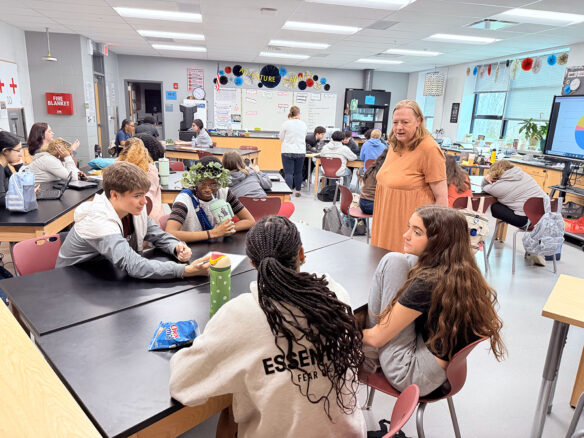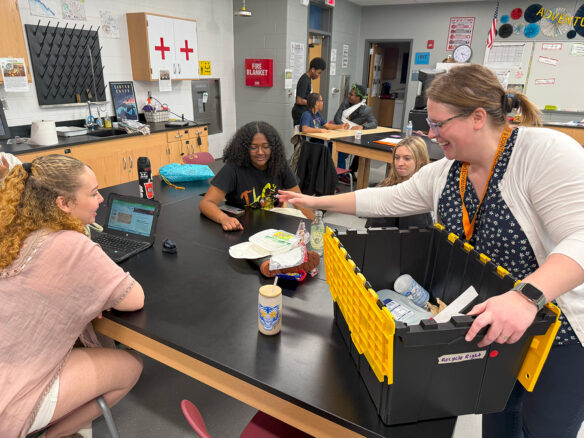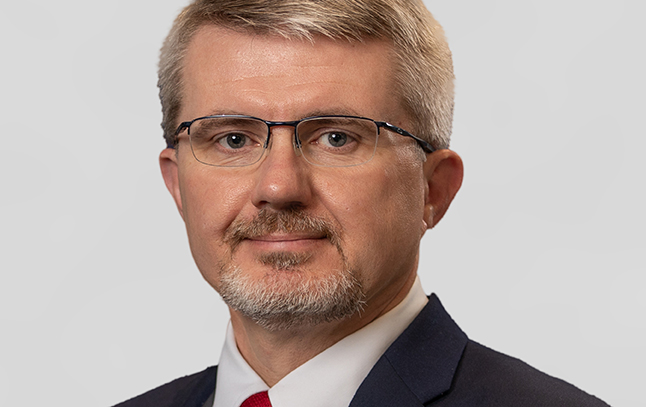
Tates Creek High School (Fayette County) teacher Cathy Sammons, standing, is a member of the Kentucky Innovative Teacher Fellowship. Photo by Rob Collins, Kentucky Department of Education, March 19, 2025
(LEXINGTON, KY) – At Tates Creek High School (Fayette County), learning isn’t confined to textbooks or traditional lectures – it’s an active, immersive process that connects students with their community, the environment, and real-world problem-solving. Under the leadership of Cathy Sammons, an educator in the Kentucky Innovative Teacher Fellowship, 10th-grade students are exploring sustainability not just as a science concept, but as a civic responsibility.
The Kentucky Innovative Teacher Fellowship is a statewide program that empowers teachers to bring learning to life by integrating vibrant, community-embedded experiences into their classrooms. Open to teachers in all 171 school districts, the fellowship provides a year-long cohort experience that supports educators in designing and implementing projects that align with the United We Learn vision of vibrant learning, innovation in assessment, and deep community collaboration. Fellows receive guidance, resources and a network of like-minded educators to help develop transformative learning experiences–just like the one I witnessed in Sammons’ classroom.
A Classroom Alive with Inquiry and Action
On this particular day, Sagan Goodpaster from Live Green Lex joined Sammons’ students for a hands-on and authentic lesson on solid waste management and sustainable living. But this was no ordinary lecture. Instead, students grappled (literally!) with the complexities of waste disposal, questioning where their trash goes, how landfills function, and what role they, as citizens of Lexington, play in shaping a more sustainable future.
A hands-on waste sorting activity sparked curiosity and debate as students examined everyday items, making decisions about what could be recycled, repurposed or sent to a landfill. Their choices weren’t about memorizing recycling rules – they were about understanding the impact of human consumption and critically engaging with environmental data. Students were asked to analyze, evaluate and make decisions and take action based on their observations. These skills and dispositions feature prominently in Kentucky’s Academic Standards for high school science. By using nationwide statistics, students analyzed the scale of landfill waste and connected scientific principles to civic implications, recognizing that Lexington’s landfill waste doesn’t just disappear – it’s transported to places like Morehead and other more rural communities in Kentucky. This realization reframed sustainability as both a scientific and ethical issue, deeply tied to social responsibility.

Sagan Goodpaster from Live Green Lex joined Sammons’ class to teach students about solid waste management and sustainable living. Photo by Rob Collins, Kentucky Department of Education, March 19, 2025
Civic Lex Day: Turning Learning into Action
But learning in Sammons’ classroom doesn’t stop at understanding – it moves toward action. Each student group is preparing a project for Civic Lex Day, where they will present sustainability-focused solutions rooted in science and community impact. Their projects aren’t just hypothetical – they have real-world applications:
- One group is collecting plastic bags to recycle and repurpose them into park benches, creating tangible, sustainable change in their city.
- Another team is developing a blog to teach Lexington residents about better recycling habits.
- Other students are scripting and recording a podcast to build knowledge about sustainable alternative transportation like biking, walking, and public transportation options.
This community-driven approach is precisely what United We Learn envisions for Kentucky classrooms, where students are more than passive recipients of knowledge; they are active problem-solvers and engaged citizens.
Building More Than Knowledge – Building Future Leaders
What makes this learning truly innovative isn’t its scientific foundation, but how it develops critical thinking, civic engagement, and leadership skills in students. Sammons’ classroom is more than a place where content is taught–it’s a space where students develop the dispositions of changemakers. They question systems, propose solutions, and work collaboratively to implement real-world projects that matter to their community.
These students are learning about sustainability and climate change while practicing democratic participation, ethical reasoning, and problem-solving. They are experiencing, firsthand, what it means to be active contributors to society.
As a Kentucky Innovative Teacher Fellow, Cathy Sammons is leading by example, showing how education can extend beyond test scores and into the realm of civic empowerment. Her work is a testament to what’s possible when teachers are given the freedom, support and resources to make learning truly transformative.
With projects like these, the next generation of Lexingtonians isn’t just learning about sustainability – they’re leading it.
Apply for the Kentucky Innovative Teacher Fellowship
The Kentucky Innovative Teacher Fellowship is now accepting applications for the 2025-2026 school year! This program is open to teachers across all 171 school districts, providing personalized professional learning and cohort-based collaboration to bring innovative, community-embedded projects to life.
Applications can be accessed by visiting the 2025-2026 Kentucky Innovative Teacher Fellowship application form and they are due by Friday, May 9. Learn more and apply to join a network of educators driving meaningful change in Kentucky classrooms.
To learn more about the Kentucky Innovative Teacher Fellowship and its parent network, the Kentucky Innovative Learning Network, contact Rob Collins.
Rob Collins is an innovative program consultant in the Kentucky Department of Education’s Office of Continuous Improvement and Support.



Leave A Comment